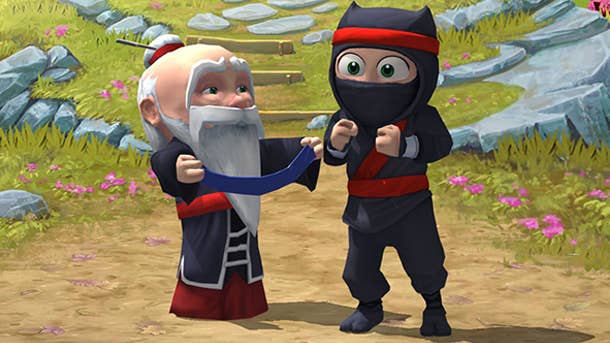Zynga feeling the Euphoria
Clive Downie on why NaturalMotion isn't another OMGPop, and how the Euphoria tech will act as a "catalyst" for creativity and emotion in its games
Zynga's earnings call last week was packed with news: The $527 million acquisition of tools and mobile game developer NaturalMotion, the layoff of 314 employees, and the projection that Zynga will turn a profit in 2014 after losing money in 2013. During the call CEO Don Mattrick, CFO Mark Vranesh and COO Clive Downie provided a lot of details, but many more questions remained. GamesIndustry International managed to get some time with Downie to ask about Zynga's future.
Zynga's acquisition of NaturalMotion brought to mind Electronic Arts' acquisition of Criterion, which like NaturalMotion was a game developer with a successful tools licensing business (Renderware). Perhaps not coincidentally, both Don Mattrick and Clive Downie were working for EA in that era. Eventually EA shut down Criterion's licensing business, which raises the question of whether NaturalMotion's Euphoria licensing will continue to be a business for Zynga. During the earnings call, Mattrick said Zynga "will continue to license Euphoria to leading creative partners." But will that be true in the long term?
"We'll evaluate all of the opportunities that are in the best interest of us and NaturalMotion, and any external partners, and then make some decisions downstream," Downie said. "We are far more focused right now on taking CSR Racing and Clumsy Ninja and building those into global franchises."
NaturalMotion's technology brings tremendously powerful character animation capabilities to mobile. Yet Zynga hasn't focused on characters in past games, so they don't have games that can immediately take advantage of this tech. Could we see some licensing of other people's characters ahead? A "Clumsy Mario" would seem a perfect fit for NaturalMotion technology.
"I think we're on the brink of being able to unlock some delightful experiences from the minds of our gamemakers around the company"
"You're absolutely right that characters have not been a traditional Zynga staple in our gamemaking," Downie agreed. "One of the many things which intrigued us about NaturalMotion was the fact that this Euphoria technology really came from a strong relationship between the player and the onscreen character. We were able to clearly visualize and articulate a course where we can revolutionize the People category on mobile with that tech, and deliver some groundbreaking, jawdropping things going forward. I think characters would form a central part of that."
The technology can lead to better game designs, Downie believes. "I think the best games are those that can take the creative inspirations and desires of the gamemaker and transpose that as effectively as possible through great technology into a product that gets to be in front of the end customer," he said. "So many times those ideas are hindered by technology, so what ends up happening is the end result is blunted. It's not as emotive as it should be or was deigned to be in the mind of the gamemaker."
"The great thing about the Euphoria technology is I can't see that happening," Downie continued. "I can see the Euphoria technology being an exceptional tool as a catalyst for gamemaking creativity. It can revolutionize a lot of the people simulation experiences that we can put in front of people on mobile. I'm really excited by that prospect."

It's not just the overall movement of the characters that Euphoria can help with - it's emotional responses. Giving the player the ability to see expressions and gestures means a game can transmit emotional context and information in a very intuitive way.
"If you're a gamemaker you want to connect with your consumer, and the way to connect is with driving emotional responses," Downie agreed. "So much of that comes from the facial characteristics, the movement, and we haven't even gotten into sound yet. We're very excited about this. We see Clumsy Ninja as the thin end of the wedge in terms of what's possible. I think we're on the brink of being able to unlock some delightful experiences from the minds of our gamemakers around the company."
One question is whether the NaturalMotion acquisition means we'll be seeing a broader variety of games from Zynga. In the past there were multiple versions of what Zynga called "invest-and-express" games that were very similar in their core mechanics, for instance. Is Zynga now looking to hit a broader range of games rather than multiple games in one genre? "It's a blend of both," Downie said. "Our aspiration is to be the number one social gaming company in the world, and to bring people together through games and elevate their gameplay through breakthrough social features."
"I'm confident we will, over time, increase the number of categories that we go after in our design to be the number one social gaming company in the world"
"To do that we need to have the number one game in a select number of categories, and those categories are defined by the very broad aspirations and entertainment likes that lots of consumers have," Downie explained. "Casino is a category, people like games of chance, they like to be lucky. Words is a category, and wordplay and everything within it, people want to be smart, they want to test themselves, they want to understand how they can compete with words against others, they want to create. Nurturing and building is a category, right now we have farming in that. Obviously with NaturalMotion we've added two other categories in terms of Racing and in terms of People."
"My sense is what you'll see is, against our own broad aspiration of creating number one products in those categories, we will have many shots on goal in those categories," Downie continued. "There are many different ways you can provide entertainment to customers using those categories. I'm confident we will, over time, increase the number of categories that we go after in our design to be the number one social gaming company in the world."
As the social game market undergoes changes, there's been a move by many companies towards "mid-core" games, typically defined as games with deeper gameplay that are still very easy to approach. Downie doesn't see that sort of distinction as being important. "Our guidance to gamemaking is to make games that significantly large amounts of people will have fun with every single day," he said. "Whether they will be mid-core, casual, arcade is, for me, largely irrelevant. I don't want to impede people with those kind of constraints. What it means is they forget the most important element of game creation, which is a focus on the customer."
It seems like there's been a cultural shift at Zynga in the process of how the company approaches designing new games. "What we're doing with our content strategy is providing our game makers with the broadest possible set of criteria to be able to bring their creativity and align that with knowledge of the customers and their behaviors," Downie described. "More than at any time in Zynga's history, our focus on the customer - and specifically the mobile customer - is more than ever."
The broad experience in gaming that both Mattrick and Downie have, along with the technology from NaturalMotion that is being used by games like Grand Theft Auto V, leads to speculation that Zynga might explore other platforms for its games, beyond mobile and Facebook. Downie, however, believes that's the wrong way to look at the question. "Our focus is on our breakthrough social entertainment," he noted. "We go where customers are, we go where we can create number one games in very broad categories, and right now that's on Facebook and on mobile."
Read more of what Clive Downie has to say about Zynga, the NaturalMotion acquisition, and its plans for advertising in games at the [a]list daily.

